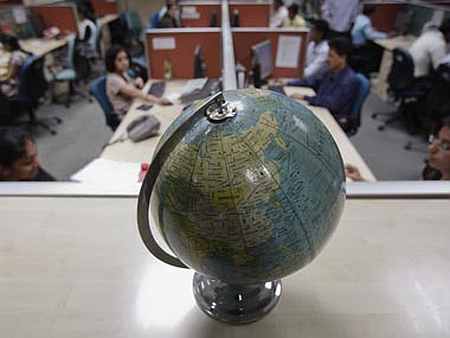Photographs: Ali Jarekji/Reuters
Investments from the Gulf Cooperation Council (GCC) countries to India remain negligible relative to trade flows and represent just a small percentage of total FDI from the region to the world, says a report.
"Foreign Direct Investment from Gulf Cooperation Council to India has picked up pace in the recent years but remains negligible relative to trade flows in terms of magnitude, said Sameena Ahmad, Managing Director at Alpen Capital in the research paper.
"It also represents just a small percentage of total FDI from GCC countries to the world. With the economic forecasts pointing to strong GDP growth in both the economies, we emphasise that there is an ample scope of strengthening economic ties between GCC and India," Ahmad said.
GCC countries include Bahrain, Kuwait, Oman, Qatar, Saudi Arabia and United Arab Emirates.
...
Investments from GCC to India remain negligible: Report
Photographs: Reuters
The report analyses the development of bilateral trade (both merchandise and services) and investment capital flows over the last 10 years, and covers the future growth potential of trade and capital flows between the two.
It says that bilateral merchandise trade between India and the GCC has grown substantially over the last decade (CAGR of 35.9 per cent over 2001-10 to USD 88.8 billion). Trade intensity between the regions has also risen led by numerous bilateral trade agreements signed in the recent past.
According to the report, capital flows in the form of FDI from GCC to India have gathered pace in the recent years, cumulating to USD 2.6 billion over April 2000 to January 2012.
Accordingly, its contribution to total FDI inflows into India (on a cumulative basis) has increased from 0.6 per cent in 2005 to 1.7 per cent as of January 2012.
...
Investments from GCC to India remain negligible: Report
Photographs: Reuters
However, it remains negligible relative to trade flows in terms of magnitude and largely represents rising investments by expatriates.
Cumulative FDI investments (April 2000 to January 2012) represented less than 3 per cent of the annual bilateral merchandise trade flows reported in 2010.
"While the GCC needs to promote more industrialisation and SME participation in order to realise its diversification dream and create jobs for its rapidly expanding population, India needs to further improve its basic infrastructure and reduce complexity in the regulatory practices," said Sanjay Vig, Managing Director at Alpen Capital.
"We recommend GCC investors to further diversify their investment portfolio by taking positions in the promising Indian investment avenues as the return on investment remain relatively robust," he added.
...
Investments from GCC to India remain negligible: Report
Photographs: Reuters
Vig said that due to its locational advantage and abundance of natural resources, GCC has the potential to serve as a manufacturing base as well as an export hub for Indian companies.
Indian businesses have been able to establish a strong presence in the GCC due to the huge Indian diaspora in the region, the report said.
Although FDI data from India to the GCC is not widely available, general information from individual country's investment agencies reveal that India has been one of the major sources of FDI flows into the GCC and is the third-largest investor in the UAE, it added.
...
Investments from GCC to India remain negligible: Report
Photographs: Reuters
Overall, it said that although the trade relationship between India and the GCC remains largely concentrated around oil, other tradable items are also slowly gaining importance due to the latter's diversification drive, said the report.
Amongst the GCC countries, UAE followed by Saudi Arabia continue to remain the largest trading partners for India.
Except Oman and UAE, investments from other GCC countries into India remain negligible compared to their global investments.
Furthermore, the analysis of the development in services trade by both regions globally indicates the demand for India's services is rising strongly in the GCC.
...
Investments from GCC to India remain negligible: Report
Photographs: Adnan Abidi/Reuters
However, India has encouragingly stepped up efforts to attract investments by relaxing regulatory restrictions and inviting GCC investors to actively participate in India's robust growth story and benefit mutually.
The power, services and construction sectors continue to account for the largest share of FDI inflows from the GCC to India, the report said.
Alpen Capital highlights significant scope for mutual cooperation between India and the GCC given their complementing economic profiles.
...
Investments from GCC to India remain negligible: Report
Over the years, GCC has developed capabilities and experience in energy, telecom, construction, real estate and infrastructure sectors.
These sectors are also growing fast and offer potentially attractive opportunities in India, which has strong expertise and scale in commercial services (financial, ITES) manufacturing, small and medium scale enterprises, food processing, and education, among others.
GCC is relatively lacking in these areas and increasingly looking for technological know-how, managerial expertise and foreign collaborations to build sustainable models for development.








article